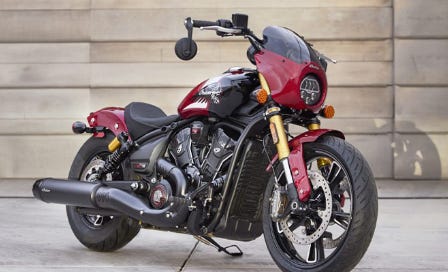Indian Motorcycle Sale Looms: Iconic Brand’s Future at Stake
Polaris Inc. may sell Indian Motorcycle to private equity by the end of July 2025—here’s what it could mean for the legendary American motorcycle brand.
By: Raine Devries @
Is Indian Motorcycle Being Sold? Exploring the Rumors and What’s at Stake
The motorcycle world is buzzing with speculation that Polaris Inc., the parent company of Indian Motorcycle, may be planning to sell the iconic American brand to private equity, potentially by the end of July 2025. As the oldest American motorcycle brand still in production, Indian Motorcycle holds immense heritage and brand equity. If these rumors are true, this could mark a pivotal moment for the company and its loyal riders. Here’s a deep dive into what this potential sale could mean for Indian Motorcycle, its future, and the broader powersports industry.
The Rumors: Is Polaris Looking to Sell Indian Motorcycle?
According to recent chatter in financial and motorcycle circles, Polaris Inc. is exploring the possibility of offloading Indian Motorcycle to address its financial challenges. Despite successfully acquiring nearly all of Indian Motorcycle’s assets and launching a range of impressive models since 2011, reports suggest the brand has yet to turn a profit. For Polaris, selling Indian could provide a quick influx of cash to reduce debt, bolster its balance sheet, and maintain its dividend payouts—a move that aligns with the company’s focus on short-term financial gains.
Indian Motorcycle’s storied history and brand recognition make it an attractive asset for private equity firms. However, the success of such a sale hinge on the buyer’s vision and strategy. Will they invest in the brand’s long-term growth, or will they prioritize short-term profits, potentially leaving Indian Motorcycle as a shadow of its former self?
Indian Motorcycle’s Financial Struggles Under Polaris
Polaris has faced criticism for its short-term focus, often prioritizing stock performance over long-term brand-building strategies. Financial analysts point out that Indian Motorcycle’s inability to generate profits may stem from this approach. Building a legacy brand like Indian requires patience and significant upfront investment—something Polaris, with its 90-day financial horizons, may not have fully embraced.
This lack of profitability doesn’t diminish Indian Motorcycle’s value. Its name carries immense weight in the motorcycling world, evoking a sense of American heritage and craftsmanship. For Polaris, selling Indian could be a strategic move to refocus on its core businesses, such as ATVs, snowmobiles, and boats, while addressing financial pressures.
Pros of Indian Motorcycle as a Standalone Company
A sale could open new opportunities for Indian Motorcycle to thrive as an independent entity. Here are some potential benefits:
Focused Leadership: As a standalone company, Indian Motorcycle could prioritize motorcycles as its core business, free from competing with Polaris’ diverse product lines.
Streamlined R&D: Without internal competition for research and development resources, Indian could accelerate innovation and bring new models to market faster.
Faster Decision-Making: Independent ownership could lead to quicker, more agile product development cycles, allowing Indian to respond to market trends and rider demands.
Authentic Brand Messaging: Indian could craft a brand identity that resonates solely with motorcyclists, distinct from Polaris’ broader powersports portfolio.
Stronger Dealer Relationships: New ownership could foster partnerships with dealers, moving away from the vendor-like dynamic some have experienced with Polaris.
Innovation-First Approach: A buyer with a long-term vision might invest in cutting-edge technology and designs, prioritizing innovation over cost-cutting.
Potential Risks of a Sale
While the idea of Indian Motorcycle as a standalone company is exciting, there are significant risks to consider:
Loss of Polaris’ Resources: Polaris’ engineering and manufacturing expertise have been critical to Indian’s revival. A new owner may lack the same infrastructure, impacting production quality and scalability.
Private Equity Pitfalls: Private equity firms often prioritize cost-cutting to maximize short-term returns, which could stifle innovation and harm the brand’s reputation.
Dealer Network Disruptions: A change in ownership could lead to realignments or instability in Indian’s dealer network, affecting customer access and support.
Financial Vulnerability: Without Polaris’ financial backing, Indian could struggle during industry downturns, especially in a competitive market.
Lack of Industry Expertise: If the buyer lacks experience in the powersports industry, they may misjudge market dynamics, similar to when auto dealers acquire powersports businesses.
Risk of Brand Dilution: A short-sighted owner might chase quick profits, compromising Indian’s heritage and quality for mass-market appeal.
What’s Next for Indian Motorcycle?
The potential sale of Indian Motorcycle raises a critical question: Would the brand be better off as a standalone company? The answer depends on the buyer’s vision, expertise, and commitment to preserving Indian’s legacy while driving innovation. A forward-thinking owner could unlock Indian’s full potential, while a profit-driven firm might exploit the brand’s value and leave it diminished.
As riders and enthusiasts, we want to see Indian Motorcycle continue to embody the spirit of American motorcycling—craftsmanship, freedom, and adventure. The coming weeks will be crucial in determining whether this sale materializes and what it means for the brand’s future.
Share Your Thoughts
What do you think about the potential sale of Indian Motorcycle? Would it thrive as an independent company, or is it better off under Polaris’ umbrella? Join the conversation on 2WheelMedia.substack.com and share your perspective. Your voice matters in shaping the future of this iconic brand.




